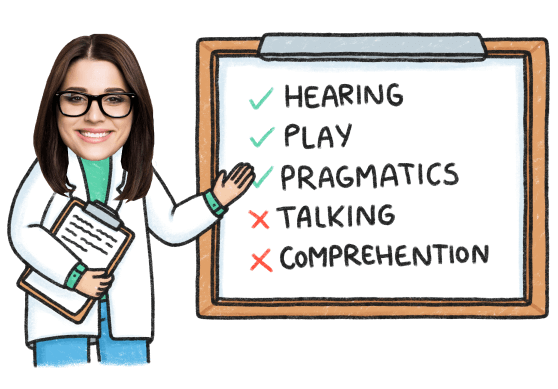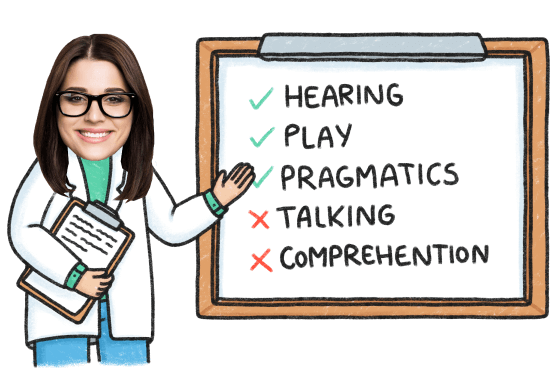“Baby Talk,” Helpful or a Hindrance?
Jan 7, 2022 Perhaps one of the most controversial topics in childhood development at the moment is “Baby Talk.” Many parents are wondering whether baby talk is good for their child’s development, or if they’re putting their child at an immediate disadvantage by going “goo-goo ga-ga.”
The reason for this debate, and all the ongoing research, is that speech and language are crucial skills that children begin to learn from infancy. It’s a well-documented fact that early speech and language skills are associated with successful reading, writing, and interpersonal skill development later in life, so it’s importance really can’t be underestimated.
Hopefully, this article can shed some light on the topic, provide you with some practical steps that you can take to promote your baby’s speech and language development, as well as set your mind at ease.
Boost Your Child’s Speech Development!
Improve language & communication skills with fun learning!

What is Baby Talk?
Baby Talk is comprised of simple sounds used in a string of charming, babbling nonsense that many parents mistakenly believe is the best way to get their child talking. To healthcare professionals, educators, and researchers; however, it’s another matter entirely.
While baby talk can certainly promote babbling and initial communication support, which is crucial to your child’s speech and language development, it doesn’t help your baby later when you wish to maximize their potential.

This means that while baby talk occurs across cultures and is almost impossible to avoid, there is a difference between talking to your baby in a way that is helpful and using baby talk in a way that is unhelpful, both of which affect your baby and their development in different ways.
Talking to your baby in a way that is helpful to your child’s speech and language development is called ‘Parentese.’
You’re successfully using Parentese if you:
- Modify your voice to make it higher
- Change your intonation to get your child’s attention
- Use mimicry, facial expressions, gestures, and smiling
- Speak slowly and clearly separate words from each other
- Use simple vocabulary and short sentences
- Use extended vowel sounds
- Heighten your emotions
- Repeat words and phrases
Parentese is Good!
Because Parentese uses slow, exaggerated sounds, it holds your baby’s attention and gives them clues on how to decode sentences, while building their vocabulary.
Some forms of Parentese, like using a sing-song voice, boost your child’s speech and language development, as making consonant and vowel sounds more clear helps babies hear the difference between them. In fact, studies have shown that babies whose parents implemented this technique had a larger vocabulary at the age of two than those whose parents did not.
Katherine White, a professor of developmental psychology, explains that for a baby, listening to adults talk to them and around them is similar to the experience we might have sitting in a room where the people are speaking a language we do not know. This means that it’s tough for babies and young children to distinguish where one word ends and the next word begins, so they have an easier time finding words when their parents use Parentese.
Please note that what makes Parentese different from Baby Talk, is that it isn’t limited to sounds only. When used correctly, Parentese ensures that you speak with correct grammar and sentence construction to help teach your child context and draw connections between words and concepts. This builds their language abilities, as well as their speech abilities.
Baby Talk is Bad!
Studies have shown that one of the main reasons parents speak to their babies using baby talk is to gain and hold their attention as opposed to explicitly wanting to teach speech and language. Using baby talk in this way isn’t necessarily a bad thing, as gaining your child’s attention is crucial for any learning to occur. However, only using this method tends to be detrimental, as parents generally use cutesy, nonsense words that don’t help develop vocabulary and language.
Making nonsense words and adopting fake terms for things (e.g., sip-sip for a cup and the act of drinking) can hinder language development and even slow down your baby’s learning. By doing this, you require your baby to learn the correct term (cup) on top of the nonsense term (sip-sip) and figure out which one is more appropriate to use.
Ultimately, chopping words and making words up based on the sound that they make is useless for a child. Meaning that while baby talk is initially constructive when your baby is very young, it can negatively affect their development if you continue to use it as your baby ages. Children require more complex speech and language input for their development as they age, and baby talk that dumbs down speech and language can slow this development.
Basically, it’s ok to change your tone of voice and facial expressions to get your baby’s attention, but you must use proper words and phrases (Parentese) to speak to your baby and to be a good model for speech and language. After all, how can your child learn quality speech and language if you don’t provide it to them?
So, What Must You Do?

What it all comes down to is having regular one-on-one conversations with your child that are all about quality and not quantity:
- When using Parentese, make sure that your speech is exaggerated with more variance and pitch, but that you don’t use nonsense words. This technique has the added benefit of teaching your baby the give-and-take of conversation, which you can develop further by imitating your baby and doing your best to respond to them even when you don’t necessarily understand what they’re saying.
- A Stanford University study has shown that speaking in longer, more varied sentences can also help boost your baby’s language skills. Based on this, you should use proper grammar as far as possible, and try and have full-sentence conversations with your baby – even if you know that they don’t understand you at all!
- Smile often at your baby, especially when they are cooing, gurgling, or attempting to speak – your smile encourages them to keep trying! Make sure you look at them during these communicative attempts and try not to get distracted with anything else in your environment. Smiling and mirroring facial expressions reinforce communication and its importance to your baby.
- Remember that gestures are one of the many ways that babies try to communicate, so feel free to imitate your baby’s gestures while you speak to them. You can also repeat simple words like “mama” and “bottle” often, and clearly, so your child begins to hear familiar words and associate them with their meaning.
- Engage your baby’s listening skills by talking to them often throughout the day and narrate the activities you do together. For example, speak and tell your baby what is happening while you feed, dress, and bathe them so that they begin to associate this vocabulary and sounds of language with everyday objects and activities.
- It’s never too early to start reading to your baby, as reading helps stimulate the developing brain. Even playing soothing music with simple lyrics is a great way to help buffer listening, vocabulary, and language development.
- As your baby ages, ensure that you continue to have one-on-one interactions with them to work on their communication actively. Additionally, use different words for the same item, as well as different types of words and longer phrases, to build their vocabulary.
All in all, it appears that there is more evidence in favor of Parentese and less evidence in favor of Baby Talk.
Parentese helps children learn speech and language, and using quality Parentese can reinforce the importance of speech and language to your baby. This positive reinforcement will encourage them to participate in the give-and-take interactions that are essential to speech and language learning and overall communication development.
Have a question for our Speech Therapists?


